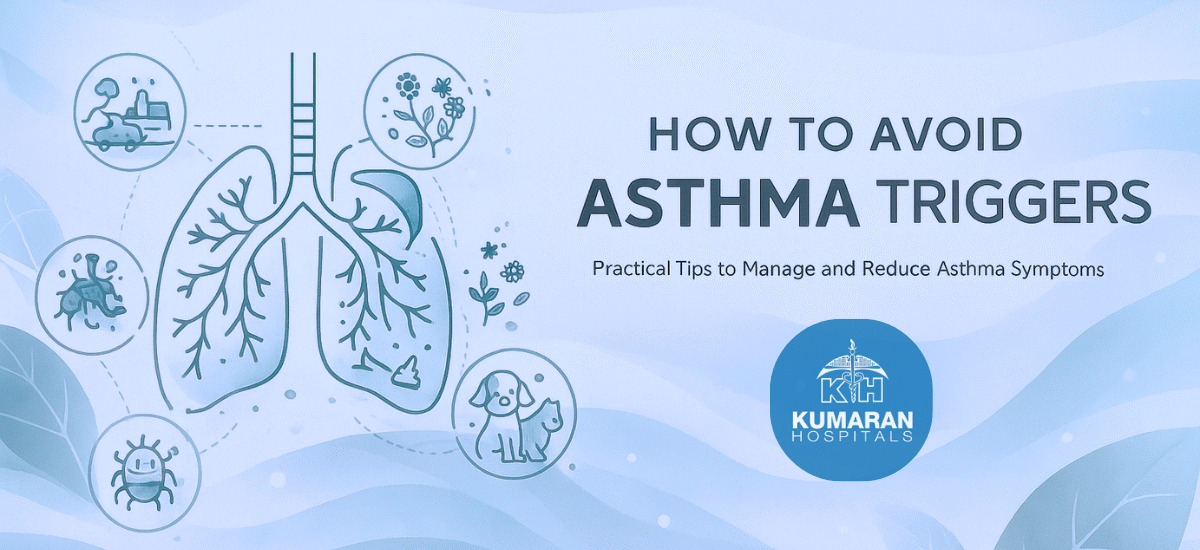If you’re searching for the best ways to prevent asthma attacks, relief starts right here. Asthma affects millions in India, but most patients can reduce symptoms and enjoy full lives by learning which triggers to avoid.
At Kumaran Hospitals, our specialists help thousands of families take control with simple strategies:
- Identify and avoid triggers like pollution, dust, and strong smells.
- Keep your home clean and well-ventilated.
- Use prescribed asthma medicines correctly, and keep inhalers handy.
- Build healthy diet habits with more fruits, veggies, and less processed food.
This guide gives you step-by-step advice trusted by Indian families and backed by our experience. Scroll down for detailed tips, expert recommendations, and true patient stories to help you breathe easier, starting today.
Understanding Asthma: What Triggers It?
Asthma is a chronic, sometimes lifelong condition where the airways in your lungs become irritated, swollen, or narrowed. You may notice wheezing, a dry or persistent cough, chest tightness, or trouble catching your breath.
Why Do Some People Get Asthma?
Doctors say there is no single answer. Genetics plays a role; if your parents have asthma, you could be at higher risk. But modern life brings its own threats: pollution, processed foods, allergies, frequent viral infections, and even emotional stress. In India, overcrowding, rapid urbanisation, and weaker air quality regulations mean asthma is more frequent and often starts young.
How Asthma Triggers Work
Think of your airways like roads; you want them wide and clear. Triggers are like unexpected traffic jams or accidents that suddenly block the way, making breathing hard. Recognising your own triggers is half the battle in controlling asthma.
Identifying Your Personal Asthma Triggers
Every person’s asthma is a bit different. The same thing might bother multiple people, but everyone has their own “top triggers”. Here’s what Indian patients commonly report:
- Outdoor air pollution: Smog from vehicles, factories, and burning waste.
- Indoor pollution & dust mites: Mattresses, carpets, old curtains, and dust-collecting corners.
- Pollen and mould: Common in tropical and coastal areas, and after the monsoon season.
- Pets: Cats and dogs, but also birds and even pet rodents.
- Weather extremes: Sudden rains, cold fronts, high humidity, or a dusty breeze.
- Food sensitivities: Peanut allergy is rarer in India, but milk, maida, and certain seafood can cause problems for sensitive people.
- Smoke: Tobacco, mosquito coils, agarbatti, and wood-burning stoves.
- Stress and strong emotions: Even laughing or crying hard can sometimes prompt symptoms.
How to Avoid and Minimise Asthma Triggers in Daily Life
Home Care Tips
- Declutter rooms and regularly dust surfaces with a damp cloth.
- Wash bedding and curtains in hot water every week to remove dust mites and allergens.
- If possible, use a simple air purifier at home, especially in bedrooms.
- Avoid storing extra mattresses, newspapers, or clothes in closed rooms for long periods.
- Keep kitchen windows open while cooking, and use an exhaust fan if available.
- Fix any leaks to prevent mould growth, especially during the rainy season.
Dealing with Weather and Pollution
- Track daily air quality (many apps available for Indian cities), and stay indoors on days with high pollution.
- Use an N95 mask when going out during a smog episode, or even a simple cloth mask if nothing else is at hand.
- Plan outdoor activities for early morning or after the rains when dust levels settle.
- On chilly or windy days, wrap a scarf over your nose and mouth before stepping outside.
Managing Triggers at Work and School
- Inform your teachers or employers about your asthma so you don’t get caught off guard during symptoms.
- Ask for a seat away from windows, dust, or direct air conditioning vents.
- Keep your medication and inhaler in your school bag or desk at work.
- If certain cleaning days or office events involve chemicals or smells, try to coordinate being outdoors when such activities occur.
Asthma Treatments: What Works Best in India?
Medication Basics for Indian Families
Asthma control is usually a combination of fast-acting medications (to stop an attack) and long-term preventive medicines (to keep airways calm).
- Inhaled steroids and relievers are the mainstay: these medicines directly target airway inflammation or quickly open up the airways.
- Oral medicines or nebulisers might be prescribed for some children or adults with frequent symptoms.
- Modern inhalers are safe and have fewer side effects than many oral medicines. If you are concerned about steroids, ask your doctor to explain how inhalers work locally without harming the rest of the body.
- Be cautious with over-the-counter cough syrups; many are not suitable for people with asthma.
Disclaimer: Always consult a qualified healthcare practitioner before starting, stopping, or changing any asthma medicine. Individual needs vary, and professional guidance is essential for safe and effective treatment.
Special Situations
- Pregnant women: Good asthma control is vital for both mother and baby. Most inhalers are safe, but inform your doctor about your pregnancy at every visit.
- Exercise-related asthma: Instead of avoiding sports, talk to your doctor about using an inhaler before activity. Warm up slowly, and stop if you feel tightness or wheezing.
- Children & elderly: Young kids and older adults require extra support to use their inhalers correctly. Family education and proper demonstration at your doctor’s clinic matter.
Asthma Monitoring: Keeping Track of Your Health
- Maintain an “asthma diary” to note down attacks, possible causes, and response to medication.
- Set reminders for checkups, and ensure asthma plans are reviewed every 6 months.
- Ask your doctor about a “peak flow meter”, a simple device to measure how well your lungs are functioning at home.
Eating Well with Asthma: Indian Dietary Guidance
Food isn’t a “cure”—but it can be your supporter! A healthy, balanced Indian diet strengthens your immunity, helps manage weight (which can otherwise worsen asthma), and reduces overall inflammation.
What to Eat
- Colourful fruits: oranges, apples, guavas, grapes, rich in antioxidants and Vitamin C.
- Green vegetables: spinach, bottle gourd, pumpkin, beans—nutrient-dense and light on the stomach.
- Lentils, brown rice, ragi, and oats: provide steady energy without triggering spikes.
- Healthy spices: small amounts of turmeric, ginger, and garlic.
- Omega-3 sources: walnuts, fish (like rohu, catla), flaxseeds.
What to Avoid
- Deep-fried snacks and high-fat fast foods.
- Sweets are heavy in artificial colour or flavour.
- Cold and raw foods straight from the fridge are especially recommended during an attack.
Best Drinks for Asthma Patients
- Warm water and herbal teas with tulsi or ginger are beneficial.
- Fresh coconut water (not from a plastic bottle).
- Limiting cold carbonated drinks, sweet lassis, or iced coffees may help reduce coughing episodes.
Realistic Daily Habits for Better Asthma Management
Life with asthma in India doesn’t mean giving up your routine or missing family fun. It means adapting, being prepared, and taking charge—not living in fear.
- Share basic asthma information in simple language with family and friends. Children should also know when to ask for help.
- Store medicines in an easily accessible place, perhaps a small “asthma kit” in your handbag, children’s backpack, or at the reception in schools.
- Keep emergency contact numbers by the door, on your phone, and with neighbours.
- During festivals or winter (when smog rises), plan indoor activities and avoid unnecessary travel.
Key Takeaways and Next Steps
Asthma care is about watching for triggers, keeping your home and environment supportive, and building a circle of informed family and friends. Indian conditions bring unique challenges, but also unique strengths—strong family support, traditional home remedies, and an excellent network of doctors.
Never shy away from asking your doctor questions, checking up for reviews of your treatment plan, and involving your children or parents in the conversation. Asthma control is a journey, and with each habit change, it gets smoother.
Need help with asthma? Contact Kumaran Hospitals for an expert consultation and take the first step towards easier breathing.
Frequently Asked Questions
Asthma cannot be cured completely, but it can be well-controlled with proper treatment and lifestyle changes. Most people live normal, active lives when symptoms are managed effectively.
Asthma often runs in families due to genetic predisposition, but it is not contagious and cannot spread from person to person.
Avoid foods or drinks that trigger your symptoms, commonly cold beverages, processed foods, and known personal allergens. Keeping a symptom diary helps identify and prevent exposure to your specific triggers.











